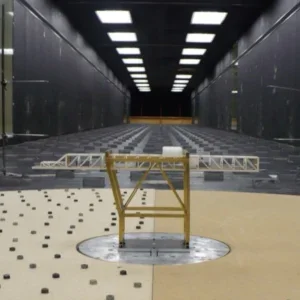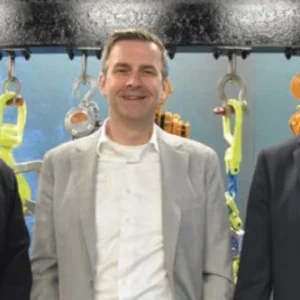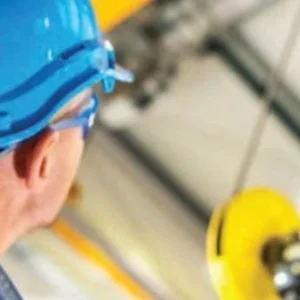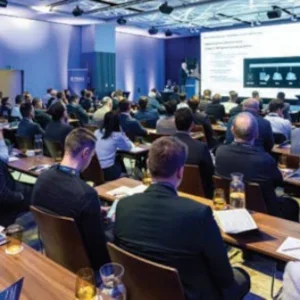It is a motto, which, to me, comes across as very modern, very topical and international – the very epitome of CeMAT as the world’s leading trade fair for intralogistics.
But it’s more than just a catchy slogan. It encapsulates perfectly the challenges facing the intralogistics industry, not to mention the edge that Germany’s providers of intralogistics solutions have over their international competitors. Allow me to explain.
"Smart" in the modern, hi-tech sense is a word with which you will no doubt all be familiar. A "smartphone," for instance, is an intelligent phone that can do everything, including make calls – if you’re connected to a network, that is! "Smart grids" are intelligent, self-managing electricity networks. And "smart efficiency" involves the intelligent integration of individual processes. In short, "smart" is a handy, short synonym for anything and everything that is intelligently networked.
Having said that, intelligent networking is nothing new in the intralogistics industry. In fact, the intralogistics industry has been at the forefront of efficient and intelligent networking and integration for quite some time. That much is clear from the example of the British technology pioneer Kevin Ashton, who coined the term "Internet of Things" in relation to his research into RFID technology.
The fact is, we already have machines that can communicate with parts, packaging and food, wherever in the world they may be. And I’m not talking about my dream refrigerator that automatically reorders my favourite beer! Not that any intralogistics process will ever be able to dispense entirely with humans, of course.
Getting down to specifics, the term "smart" has the following meaning at CeMAT:
1. The individual physical elements of intralogistics processes are becoming increasingly intelligent. And this intelligence is increasingly being used to control autonomous systems.
2. As a result, the level of intelligent automation in industrial processes is increasing markedly.
3. Intelligent automation enables greater efficiency in the integration and networking of industrial processes.
In manufacturing and assembly, this convergence of the virtual and physical worlds is known as the Fourth Industrial Revolution, or Industry 4.0.
In Industry 4.0, all processes will be linked via decentralized control systems – much like the Internet of Things. It’s a bit like a colony of ants. Each ant has its own specialized job. None of these jobs is particularly complex in and of itself, and no ant on its own will ever move a mountain. But working collaboratively, the ants constitute an extremely productive and flexible integrated system that can achieve great things.
To give a more concrete, manufacturing example: Industry 4.0 refers to a future where individual work-pieces can make their own way to the correct machine and tell it exactly how to process them. The idea is to make very small production runs – even single-lot runs – just as cost effective as mass production. Industry 4.0 is a new manufacturing paradigm that is more customizable, flexible and productive than everything that has gone before it.
The intralogistics industry lies at the heart of this trend. The main role of our industry has always been to process orders of all sizes – even single-lot orders – quickly, intelligently and hence efficiently, and it is a role that has gained in importance exponentially since the advent of eCommerce.
The total integration of diverse processes, processing stations, storage containers, packing units and goods across multiple locations around the globe has long been an integral part of intralogistics. All of these elements are able to make their way reliably to the right stage of the value chain thanks to one thing – the Internet.
I would even go so far as to say that Industry 4.0 is already a reality in the intralogistics industry. Achieving this vision requires secure and reliable technology – integrated systems and classic intralogistics products, obviously, but also microprocessors, operating elements and controls, software and much more besides. In this sense, the market for intralogistics solutions is a market with enormous potential. And this potential will be on show at CeMAT 2014.
The message here is that intralogistics is increasingly a matter of software and process management – areas in which the pace of innovation is very fast. That is why we in the intralogistics industry are delighted that CeMAT will now be held every two years instead of every three. The increased frequency will enable us to showcase our innovations to our international customers while they are still current and fresh.
The intralogistics industry’s high level of integration makes it a model for all other industries. The word "Integrated" in the official motto for CeMAT 2014 indicates that in the intralogistics industry, the integration revolution has already happened. It’s certainly well advanced in any event, with the intelligent integration of multiple processes now commonplace in many areas. Let me give you an example from our own company. The Beumer Group provides conveyor and loading technology, palletizing and packaging systems, and sorting and distribution technologies.
We combine these technologies to tailor solutions for our customers. Our systems are used, for example, in the extraction of raw building and construction materials. For our customers in this industry we provide complete materials handling solutions – everything needed to get the raw materials out of the quarry, into bags and onto fully packaged, transport-ready pallets. Our solutions are turnkey plants in which all the individual parts work together perfectly to form a fully integrated whole.
The bigger these kinds of plants are, the more control systems they use. The various control systems therefore need to be able to communicate intelligently with one another. That is why we provide fully integrated drivetrain and actuator systems, complete with the necessary machinery and plant control systems. Providing both the hardware and software from a single source in this way also makes for rapid, problemfree commissioning.
I have no doubt that the intralogistics industry’s unwavering commitment to meeting the ongoing market demand for good ideas and new technologies is a model many other industries will seek to emulate. Therefore, CeMAT is one of the world’s most important platforms for innovative companies and products.






